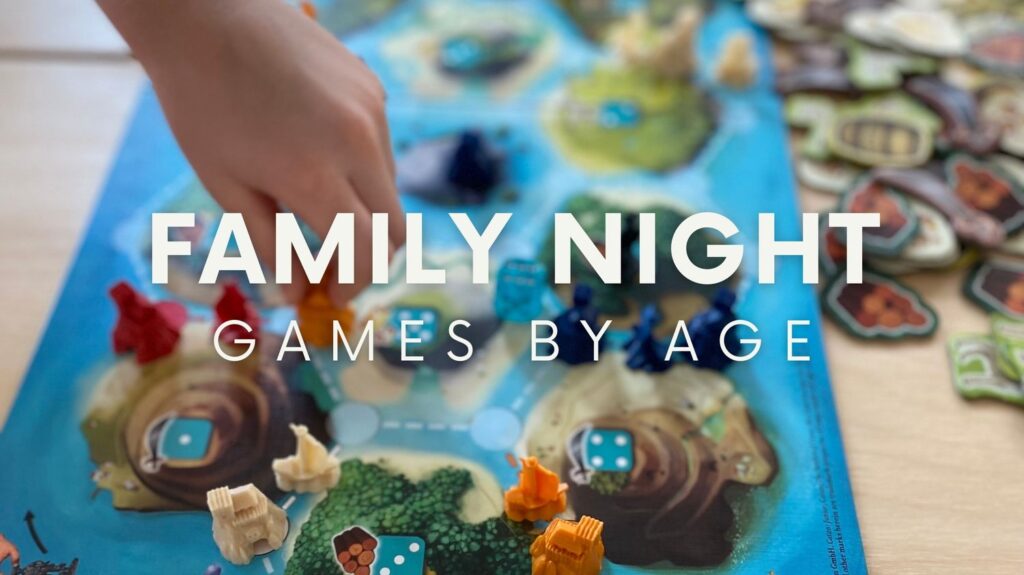We recommend products we would use ourselves and all opinions expressed here are our own. This post may contain affiliate links, which means we might make a small commission at no extra cost to you. This helps us keep the blog running. See our full disclosure here.
Fun & Engaging Family Night: Game Ideas by Age Group
I have several family night games by age I can’t wait to share with you. Family game nights may seem like fun and games, but games and play are important aspects of child development. I am here to help you with family game night ideas and assist in selecting games according to age group for your next family night. First I’d like to show what types of games kids can handle developmentally and then give you some game suggestions. My suggestions are great game gift ideas during the holiday season.
“Playing encourages a child’s desire to explore and discover new things. This encourages the youngster to develop control over their surroundings, which improves focus and concentration. It also allows the child to participate in the flexible and higher-level cognitive processes that are considered necessary for new-age learners. These include problem-solving, analysis, evaluation, application of information, and creative inquiry processes.”
New Path Learning
Setting the Stage for Family Gaming Success
Preparing for a family night means embracing a mix of excitement, varying attention spans, sore-losing struggles, and different energy levels from the youngest to the oldest family members. Learning how different ages respond to games generally helps support a fun and harmonious atmosphere by setting expectations upfront.
If you know what you are getting into with temperaments, you will have a better understanding and plan of action when said temperaments flare.
With this in mind, let’s gain an idea of what to expect for your next family night based on your kids’ age group.
Age-Appropriate Considerations for Family Game Night
- Toddlers and Preschoolers: Expect shorter attention spans and high energy levels. For this reason, choose games suitable for their age, like simple matching or sorting games. Find cooperative board games that encourage teamwork over a sole winner. Losing is a very tough concept at this age. If your child does not understand or desire to play by the rules, tell them you will play by the rules the first time, and then they can make up the rules the second time.
- Elementary Age: Curiosity peaks, competitiveness emerges. Opt for games with clear rules and easy-to-follow instructions, fostering cooperation and a little competition. Time-based games can put kids on edge and cause panic and frustration in younger elementary-age kids, so opt for slower-paced board or card games. And plan for breaks. Losing is still a hard concept during early elementary, but introducing the notion and talking through it is a good way to start wiring those brains for future life disappointments. Goal setting and strategy can start developing during these years as well.
- Teens and Older: Embrace a mix of humor and challenge. Strategy-based games or trivia can, for the most part, keep older ages engaged and entertained. Don’t stop playing games when your kids get older! Games can help develop critical thinking, problem-solving, creative thinking, and decision-making skills. In addition to building skills, the relaxed environment can open the table to intimate discussions and bonding.
Have Various Ages? – Team Building to the Rescue
Choosing the right family games to play can set the mood for an enjoyable evening for everyone. If you have various age spans in your family, try creating teams so that younger players can learn with the help of older players.
Also, don’t forget the food. Plan your game night food so everyone comes to the table with happy bellies and good energy. Getting everyone involved in food preparation and clean up is another bonding family night endeavor.
Family Night Games By Age
Below is a list of family game recommendations tailored to different ages. Let’s ensure that every member of the family has a fantastic time! The following lists are great family night game gift ideas during the holiday season. They are family games to play at home or great for family vacations.
Budget-Friendly Family Game Gift Ideas
There are many ways to play games beyond board games. Below are lists of fun family night games for any age.
Classic Card Games
- spades
- gin rummy
- spoons
DIY Family Games
- making indoor putt-putt courses
- setting up hallway bowling
- keeping a balloon from hitting the ground
Holidays or vacations are another way to engage in family games. Having puzzles displayed for daily rendezvous is a wonderful way to spend time away from work and school.
Looking for other ways to play while teaching your kids? — Check out our post about getting your kids involved in the kitchen.
Family Game Night Ideas – Game On!
Planning a family game night includes selecting games that cater to everyone’s interests and abilities. Understanding the dynamics of different age groups and choosing games that ultimately resonate make family night more enjoyable and inclusive for everyone.
Incorporating these game recommendations into your family night can provide an evening filled with laughter, bonding, and memories. Let me know in the comments below if you have any game night traditions or ideas for family games to play with different ages.
Do you want to serve food for family game night? I have you covered! Check out my post on fun food for family games.



